2 沪教版七年级下英语教材第二单元总结
- 格式:pdf
- 大小:463.76 KB
- 文档页数:9

沪教牛津版英语七年级下册第二单元作文English:In the second unit of Oxford Shanghai English Grade 7 Book of China, students have learned about different festivals and celebrations around the world. From Chinese New Year to Halloween, students have explored the unique customs, traditions, and symbols associated with each festival. They have also practiced using simple future tense to talk about their plans for future celebrations and holidays. Furthermore, students have honed their reading comprehension skills by reading various texts about festivals and answering questions to demonstrate their understanding. Through group discussions and sharing sessions, students have further deepened their cultural awareness and empathy towards different traditions and customs. Overall, this unit has not only expanded students' knowledge of global cultures but also fostered a sense of appreciation and respect for diversity in the world.中文翻译:在中国上海牛津七年级下册的第二单元中,学生学习了世界各地不同的节日和庆祝活动。
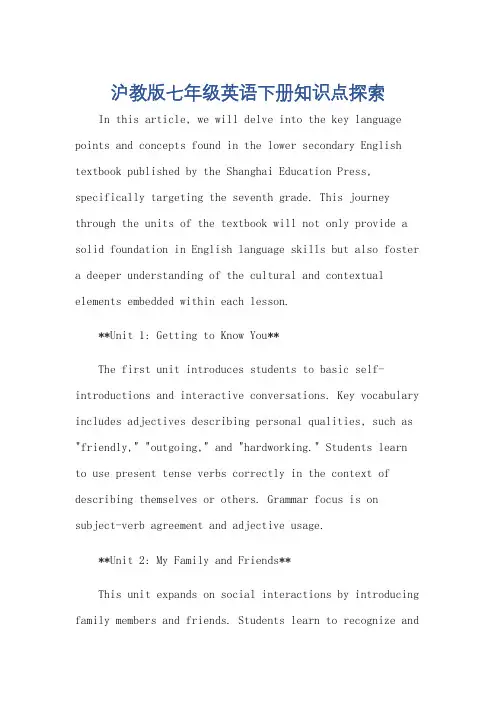
沪教版七年级英语下册知识点探索In this article, we will delve into the key language points and concepts found in the lower secondary English textbook published by the Shanghai Education Press, specifically targeting the seventh grade. This journey through the units of the textbook will not only provide a solid foundation in English language skills but also foster a deeper understanding of the cultural and contextual elements embedded within each lesson.**Unit 1: Getting to Know You**The first unit introduces students to basic self-introductions and interactive conversations. Key vocabulary includes adjectives describing personal qualities, such as "friendly," "outgoing," and "hardworking." Students learn to use present tense verbs correctly in the context of describing themselves or others. Grammar focus is on subject-verb agreement and adjective usage.**Unit 2: My Family and Friends**This unit expands on social interactions by introducing family members and friends. Students learn to recognize anduse vocabulary related to family members, such as "uncle," "aunt," and "cousin." They also practice using the present continuous tense to describe actions and activities. Additionally, they are introduced to the concept of possessive pronouns.**Unit 3: My School Life**School life becomes the focus of Unit 3, introducing vocabulary related to school subjects, activities, and schedules. Students learn to use the present simple tense to describe routines and habits. Grammar emphasis is placed on the correct use of prepositions and article changes.**Unit 4: Hobbies and Activities**Hobbies and extracurricular activities are explored in Unit 4, encouraging students to talk about their interests and preferences. New vocabulary covers a range of activities, from sports to artistic pursuits. Students practice using the future tense to express plans and intentions. This unit also introduces modal verbs to express possibility and necessity.**Unit 5: Health and Body**The topic of health and the human body is addressed in Unit 5, covering vocabulary related to physical well-being and exercise. Students learn to discuss healthy habits and routines using the present tense and adjective comparisons. Grammar focus is on using adverbs to describe manner and degree.**Unit 6: Holidays and Festivals**The final unit of the textbook delves into the world of holidays and festivals, introducing vocabulary specific to different cultural celebrations. Students learn to describe festival traditions and activities using the past tense. This unit also covers conditional sentences, allowing students to express hypothetical situations and consequences.Throughout these units, students not only acquire language skills but also gain a deeper understanding of cultural differences and the importance of communication in everyday life. The blended approach of English language learning with cultural understanding prepares students for more advanced language challenges and global interactions. **沪教版七年级英语下册知识点探索**本文将对上海教育出版社出版的七年级下册英语教材中的关键知识点和概念进行深入探讨。
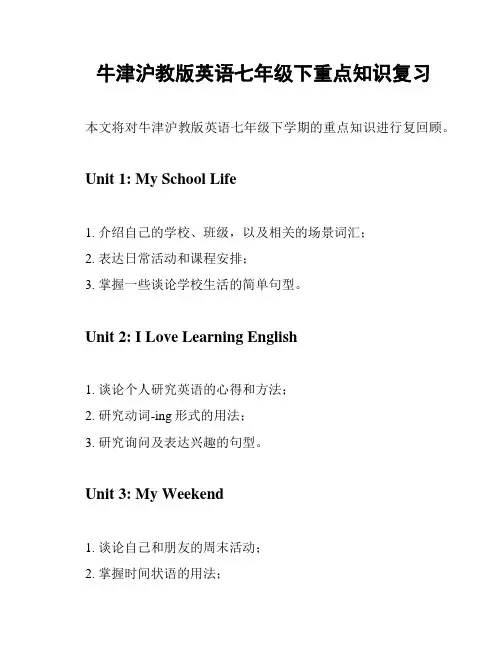
牛津沪教版英语七年级下重点知识复习
本文将对牛津沪教版英语七年级下学期的重点知识进行复回顾。
Unit 1: My School Life
1. 介绍自己的学校、班级,以及相关的场景词汇;
2. 表达日常活动和课程安排;
3. 掌握一些谈论学校生活的简单句型。
Unit 2: I Love Learning English
1. 谈论个人研究英语的心得和方法;
2. 研究动词-ing形式的用法;
3. 研究询问及表达兴趣的句型。
Unit 3: My Weekend
1. 谈论自己和朋友的周末活动;
2. 掌握时间状语的用法;
3. 掌握一些听力技巧。
Unit 4: Jobs
1. 研究表示职业的词汇;
2. 表达及询问个人志愿和理想。
Unit 5: Food and Drink
1. 研究食物和饮品的词汇;
2. 掌握询问及表述食物喜好和不喜好的方法。
Unit 6: Sports and Hobbies
1. 研究表示不同体育项目和爱好的单词;
2. 表达及询问个人感受和喜好。
Unit 7: Travelling
1. 谈论旅游的相关话题;
2. 表达和询问喜欢或不喜欢旅游的理由和偏好。
Unit 8: Festivals and Celebrations
1. 研究表示节日和庆祝活动的单词;
2. 谈论家庭或朋友间的庆祝活动。
总结
以上是牛津沪教版英语七年级下学期的重点知识复习,希望对大家的英语学习有所帮助。

七年级下沪教版英语u2知识点在七年级下学期的沪教版英语教材中,第二个单元主要学习生活场景中常见的英语用语,如问路、介绍自己等。
在学习这些话题的同时,还需要掌握一些基础知识,下面将重点介绍有关的知识点。
1. 人称代词在英语中,人称代词用于代替人或事物。
根据代替的对象不同,人称代词分为主格、宾格、所有格三种。
主格代词用于作主语,宾格代词用于作宾语,所有格代词用于表示所有关系。
如:I am a student.(主格)→ Me too.(宾格)My book is here.(所有格)2. be动词be动词是英语中最基础的语法之一,用于表达主语的身份、状态等。
常用的be动词有am、is、are三种形式,需要根据主语的单复数和人称来进行变化。
例如:I am a student.He is my friend.They are students.3. 物主代词物主代词是用来表示所属关系的代词,常见的有my、your、his、her、its(表示物)、our、their等。
如:This is my book.That pencil is yours.The football belongs to him.4. 介词英语中的介词用于表示位置、时间、方式等关系,在句子中常常和其他词搭配使用。
如:He is sitting on the chair.I have an English class at 9 o'clock.We go to school by bus.5. 时间表达时间的表达方式有很多种,包括点钟时间、时间段、日期等。
在口语交流中,使用得比较多的是点钟时间和时间段。
例如:It's 2 o'clock.We have a break from 10 to 10:15.Today is September 1st.以上就是七年级下沪教版英语u2知识点的介绍。
通过学习这些基础知识,可以更好地理解和掌握生活场景中常见的英语用语,进而提高英语口语表达和交流能力。

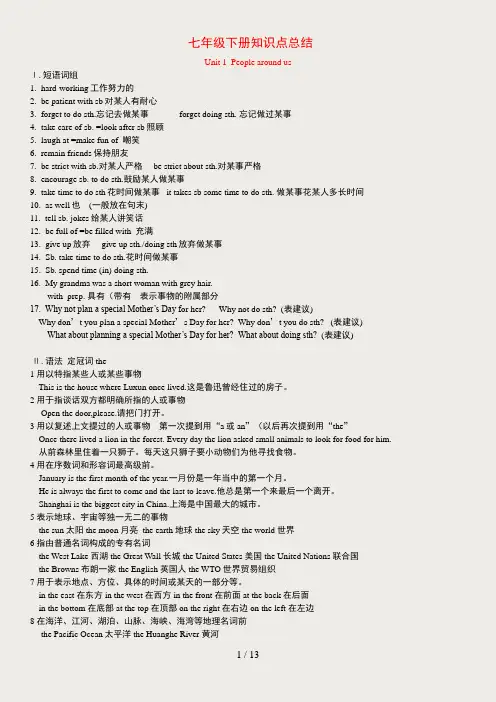
七年级下册知识点总结Unit 1 People around usⅠ. 短语词组1. hard-working工作努力的2. be patient with sb对某人有耐心3. forget to do sth.忘记去做某事 forget doing sth. 忘记做过某事4. take care of sb. =look after sb照顾5. laugh at =make fun of 嘲笑6. remain friends保持朋友7. be strict with sb.对某人严格 be strict about sth.对某事严格8. encourage sb. to do sth.鼓励某人做某事9. take time to do sth花时间做某事 it takes sb some time to do sth. 做某事花某人多长时间10. as well也(一般放在句末)11. tell sb. jokes给某人讲笑话12. be full of =be filled with 充满13. give up放弃 give up sth./doing sth放弃做某事14. Sb. take time to do sth.花时间做某事15. Sb. spend time (in) doing sth.16. My grandma was a short woman with grey hair.with prep. 具有(带有表示事物的附属部分17. Why not plan a special Mother’s Day f or her? Why not do sth? (表建议)Why don’t you plan a special Mother’s Day for her? Why don’t you do sth? (表建议) What about planning a special Mother’s Day for her? What about doing sth? (表建议)Ⅱ. 语法定冠词 the1 用以特指某些人或某些事物This is the house where Luxun once lived.这是鲁迅曾经住过的房子。
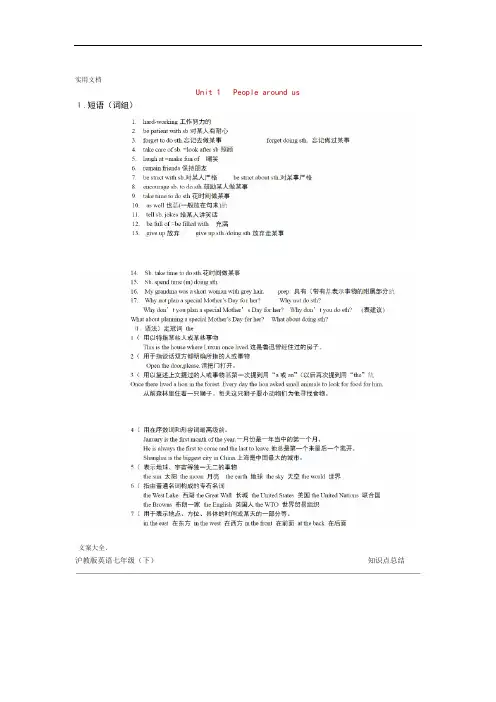
实用文档
Unit 1 People around us
Ⅰ.短语(词组)
文案大全.
沪教版英语七年级(下)知识点总结
2
知识点总结沪教版英语七年级(下)
16.
3
沪教版英语七年级(下)知识点总结
Unit 3 our animals friends
&词组短语Ⅰ.
4
沪教版英语七年级(下)知识点总结
5
沪教版英语七年级(下)知识点总结
6
沪教版英语七年级(下)知识点总结
7
沪教版英语七年级(下)知识点总结
8
沪教版英语七年级(下)知识点总结
9
沪教版英语七年级(下)知识点总结
01
沪教版英语七年级(下)知识点总结
11
沪教版英语七年级(下)知识点总结
Unit 7 poems
21
沪教版英语七年级(下)知识点总结
31
沪教版英语七年级(下)知识点总结
Ⅱ.语法 when 引导的时间状语从句。
一、
41
沪教版英语七年级(下)知识点总结
51。
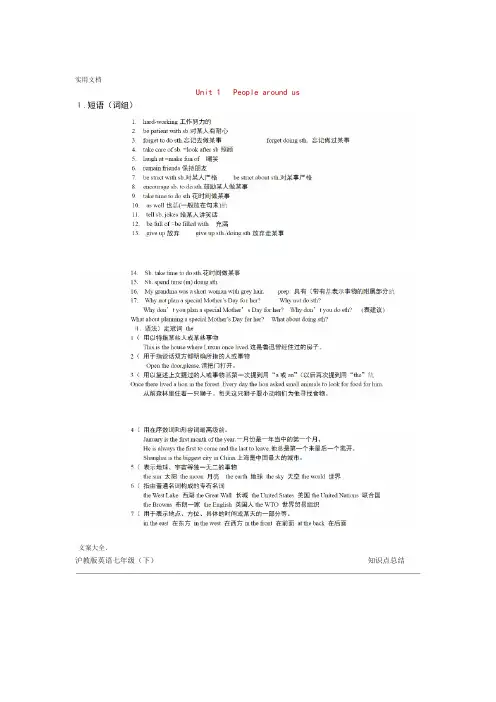
实用文档
Unit 1 People around us
Ⅰ.短语(词组)
文案大全.
沪教版英语七年级(下)知识点总结
2
知识点总结沪教版英语七年级(下)
16.
3
沪教版英语七年级(下)知识点总结
Unit 3 our animals friends
&词组短语Ⅰ.
4
沪教版英语七年级(下)知识点总结
5
沪教版英语七年级(下)知识点总结
6
沪教版英语七年级(下)知识点总结
7
沪教版英语七年级(下)知识点总结
8
沪教版英语七年级(下)知识点总结
9
沪教版英语七年级(下)知识点总结
01.
沪教版英语七年级(下)知识点总结
11.
沪教版英语七年级(下)知识点总结
Unit 7 poems
21.
沪教版英语七年级(下)知识点总结
31.
沪教版英语七年级(下)知识点总结
Ⅱ.语法 when 引导的时间状语从句。
一、
41.
沪教版英语七年级(下)知识点总结
51.。

初一下Unit 2 ——单元复习一、单词拼写1.Paris is the capital of F____________.2.W____________ is the most famous drink in France.3.The Eiffel Tower is the most famous tower in E____________.4.Guangzhou is in the s____________ of China.5.Would you like to go s____________ on the mountain in winter.6.We use l____________ to go up and down in tall buildings.7.What’s the d____________ today? It’s March 13th.8.People in France speak F____________.9.We can find the a____________ on the top of the corner in a letter.10.The party was p____________. All the people enjoyed themselves last night.11.There is a picture of the British f____________ on his T-shirt.12.Please t____________ the right answers to the questions.13.—Is it p____________ for you to come here in 10 minutes? —Are you joking?14.There is a d____________ s__________ at the corner of the street. You can buy anything youwant there.15.Kathy is the most e____________ student in our class. All the teachers like her very much.16.His house l____________ in the centre of the city, so it is very expensive.17.I p____________ to stay at home in such a hot day.18.There are many beautiful beaches on the c____________.19.Do you know Lily’s a____________? I want to write a letter to her.20.I can’t f____________ the work on time without your help.二、完成句子1.北京有许多名胜。

7B-U2课本短语总结一、单词1、France n. 法国[frɑːns]2、French adj.法国的[frentʃ]3、flag n.旗帜[flæɡ]4、wine n.葡萄酒[waɪn]5、tick v.标记号,打上勾[tɪk] n. 对号6、possible adj. 可能的[ˈpɒsəbl]impossible adj. 不可能的possibly adv. 可能地possibility n. 可能性7、Europe n.欧洲[ˈjʊərəp] 欧洲人adj. 欧洲人的、欧洲的8、store n.(大型)百货商店[stɔː] 近义词:shopdepartment store 百货商店9、vineyard n.葡萄园10、excellent adj.优秀的['eksələnt]be excellent at/in sth 在某方面优秀be excellent for…在…方面很出色11、south n.南方,南部[saʊθ]Southern adj. 南方的Southerner n. 南方人12、lie v. 位于,坐落于; 躺、平躺[laɪ] 过去时lay 过去分词:lain 现在分词:lyinglie on : 位于,表示两地接壤lie in :位于,表在…范围之内lie to:位于,表示两地不接壤v. 撒谎过去分词:lied 现在分词:lying n. 谎言、谎话tell a lie 说谎13、coast n.海岸,海滨[kəʊst]14、perfect adj.完美的[pɜːfɪkt]Perfectly adv. 完美地15、prefer v.更喜欢[prɪ'fɜː]16、ski v.滑雪[skiː]Go skiing 去滑雪17、tower n.塔[ˈtaʊə]18、finish v.完成['fɪnɪʃ] 近义词:completefinish doing sth. 结束做某事19、lift n.电梯,升降机[lɪft] 近义词:elevatortake the lift = go by lift 乘电梯v. 举起、抬起20、step n.台阶[step]step by step 逐步地21、stairs n.[pl.]楼梯upstairs adv. 在楼上downstairs adv. 在楼下go up the stairs 上楼go down the stairs 下楼22、receiver n.接收者[rɪˈsiːvə]receive v. 接收23、date n.日期[deɪt]24、greeting n.问候[ˈɡriːtɪŋ]greet v. 问候25、address n.地址[ə'dres]二、短语1、(be)famous for 以...而闻名2、prefer to 更喜欢3、go on holiday 去度假4、go sightseeing 去观光5、travel around the world 环游世界6、Don’t be silly 别傻了7、in a diary 在日记中8、in a travel magazine 在旅游杂志中9、in Western Europe 在西欧10、a country with many beautiful places 一个有很多美丽地方额国家11、a place of interest =interesting places 名胜12、such as 例如13、in the center of…在…的中心14、grow grapes 种葡萄15、make excellent French wine 生产优质的法国红酒16、lie on 坐落于17、the perfect place for a summer holiday 完美的暑假旅游圣地18、prefer to do sth. 更喜欢做某事19、try doing sth. 尝试做某事20、on the mountains 在山上21、in the French Alps 在法属的阿尔卑斯上22、have something for everyone 有适合每个人的东西23、on the coast 在海岸线上24、move over snow 在雪上移动25、the capital of……的首都26、learn something about 了解关于…的情况27、in the north of…在…北方28、be different from 与…不同The same as 与…一样29、a winter holiday 一个寒假30、think of 想到31、every seven years 每七年P.2032、the top of……的顶部P.2033、take the lift 乘电梯P.2034、walk up 向上走P.2035、go down the stairs 下楼梯P.2036、plan to do sth. 计划做某事P.2237、on an e-friend website 在一个电子交友网站上P.2338、be friends with sb. 与某人成为朋友P.2339、be far away from …距离…远P.2340、be interested in…对…感兴趣P.2341、Thai culture 泰国文化P.2342、Thai food 泰国食物P.2343、one day 一天P.2344、tell sb. about oneself 告诉某人关于自己的情况P.2345、Best wishes 最美好的祝愿P.2346、a bottle of French wine 一瓶法国红酒P.2447、have cats and rabbits as pets 养猫和兔子作为宠物P.2448、lie on the bed 躺在床上P.2449、on a trip to … with sb. 和某人去…的旅行P.2450、would like to do = want to do 想要做某事P.2451、lean to one side 向一边倾斜P.2652、be known as 被称为P.2653、make sb./sth. + adj. 使某人某物…P.2654、the upper floors 上面的楼层P.2655、over the years 年复一年P.2656、be closed to…向…关闭57、for safety reasons 处于安全的原因58、at least 至少59、a popular style of …. 一种流行的…方式60、go backpacking 背包旅行61、spend money on…在…方面花钱62、go from city to city 从一个城市到另一个城市63、capital city 首都三、重点单词短语辨析1、Here you will find many famous places of interest such as the Eiffel Tower. P.17such as : 意为“例如”,用来列举整体之中的几个例子,用逗号和主句分开,后面不用逗号,直接加名词,常与and so on 连用e.g. He knows many languages, such as English 、Chinese、French and so on.for example:意为“例如”,用来列举同类事物中的一个例子,前后都要有逗号,可以放在句首、句中、句末。
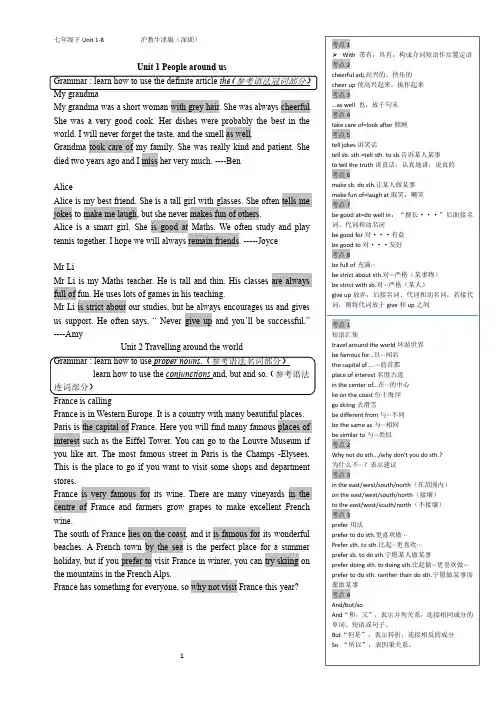
七年级下Unit 1-8沪教牛津版(深圳)Unit 1People around usMy grandma was a short woman with grey hair.She was always cheerful.She was a very good cook.Her dishes were probably the best in the world.I will never forget the taste,and the smell as well.Grandma took care of my family.She was really kind and patient.She died two years ago and I miss her very much.----Ben AliceAlice is my best friend.She is a tall girl with glasses.She often tells me jokes to make me laugh,but she never makes fun of others.Alice is a smart girl.She is good at Maths.We often study and play tennis together.I hope we will always remain friends.-----Joyce Mr LiMr Li is my Maths teacher.He is tall and thin.His classes are always full of fun.He uses lots of games in his teaching.Mr Li is strict about our studies,but he always encourages us and gives us support.He often says,“Never give up and you’ll be successful.”----AmyUnit 2Travelling around the worldFrance is in Western Europe.It is a country with many beautiful places.Paris is the capital of France.Here you will find many famous places of interest such as the Eiffel Tower.You can go to the Louvre Museum if you like art.The most famous street in Paris is the Champs -Elysees.This is the place to go if you want to visit some shops and department stores.France is very famous for its wine.There are many vineyards in the centre of France and farmers grow grapes to make excellent French wine.The south of France lies on the coast,and it is famous for its wonderful beaches.A French town by the sea is the perfect place for a summer holiday,but if you prefer to visit France in winter,you can try skiing on the mountains in the French Alps.France has something for everyone,so why not visit France this year?考点1With 带有,具有,构成介词短语作后置定语考点2cheerful adj.高兴的,快乐的cheer up 使高兴起来,振作起来考点3...as well 也,放于句末考点4take care of=look after 照顾考点5tell jokes 讲笑话tell sb.sth.=tell sth.to sb.告诉某人某事to tell the truth 讲真话,认真地讲,说真的考点6make sb.do sth.让某人做某事make fun of=laugh at 取笑,嘲笑考点7be good at=do well in ,“擅长···”后面接名词、代词和动名词be good for 对···有益be good to 对···友好考点8be full of 充满···be strict about sth.对···严格(某事物)be strict with sb.对···严格(某人)give up 放弃,后接名词、代词和动名词,若接代词,则将代词放于give 和up 之间考点1短语汇集travel around the world 环游世界be famous for...以···闻名the capital of...···的首都place of interest 名胜古迹in the center of...在···的中心lie on the coast 位于海岸go skiing 去滑雪be different from 与···不同be the same as 与···相同be similar to 与···类似考点2Why not do sth.../why don’t you do sth.?为什么不···?表示建议考点3in the east/west/south/north (在范围内)on the east/west/south/north (接壤)to the east/west/south/north (不接壤)考点3prefer 用法prefer to do sth.更喜欢做···Prefer sth.to sth.比起···更喜欢···prefer sb.to do sth.宁愿某人做某事prefer doing sth.to doing sth.比起做···更喜欢做···prefer to do sth.ranther than do sth.宁愿做某事而愿做某事考点4And/but/soAnd “和,又”,表示并列关系,连接相同成分的单词、短语或句子。
沪教版英语七年级下册知识点归纳全文共3篇示例,供读者参考篇1Shanghai Edition English Grade 7 Volume 2 Knowledge SummaryIn the Shanghai Edition English Grade 7 Volume 2, students will continue to build upon the foundation laid in the first volume. The focus of this volume is on expanding vocabulary, improving reading comprehension skills, and mastering grammar rules. Here is a summary of the key knowledge points covered in this volume:1. Vocabulary: Students will learn new words and phrases related to various topics such as sports, health, the environment, and technology. They will also practice using these words in sentences to improve their vocabulary and communication skills.2. Reading Comprehension: Students will read a variety of texts, including short stories, news articles, and informational texts. They will practice reading for main ideas, details, and inferences, as well as making connections between different pieces of information.3. Grammar: In this volume, students will review and expand their knowledge of grammar rules, including verb tenses, prepositions, conjunctions, and adverbs. They will practice using these rules in sentence structure and writing exercises.4. Speaking and Listening: Students will work on improving their speaking and listening skills through activities such as role plays, group discussions, and listening to audio recordings. They will practice expressing their opinions, asking questions, and giving short presentations.5. Writing: Students will continue to work on their writing skills by practicing writing different types of texts, such as letters, essays, and summaries. They will focus on organizing their ideas, using correct grammar and punctuation, and developing a clear and coherent writing style.Overall, the Shanghai Edition English Grade 7 Volume 2 provides students with a solid foundation in English language skills and prepares them for more advanced levels of study. By mastering the knowledge points covered in this volume, students will be able to communicate effectively in English and succeed in their academic and professional pursuits.篇2Knowledge Summary of Shanghai Version English Grade 7, Second SemesterIn the second semester of Grade 7 in Shanghai, students will continue to build on the English language skills they have learned in the first semester. The focus of this semester is on expanding vocabulary, improving grammar and sentence structure, and increasing reading and writing proficiency. Here is a summary of the key knowledge points covered in the second semester of Grade 7 English:1. Vocabulary Expansion:- Students will learn new vocabulary words related to everyday topics such as family, school, food, hobbies, travel, and health.- They will also learn to use adjectives, adverbs, and prepositions to describe people, places, things, and experiences.2. Grammar:- The second semester will cover more advanced grammar concepts including verb tenses (simple past, present continuous, future), modal verbs (can, could, may, might, must, shall, should, will, would), and conditionals (zero, first, second, and third).- Students will practice forming questions, negative sentences, and complex sentences using conjunctions and relative pronouns.3. Reading Comprehension:- Students will read a variety of texts including stories, articles, and poems to improve their reading comprehension skills.- They will learn how to identify main ideas, supporting details, and the author's purpose in a text.4. Writing:- Students will practice writing different types of texts such as narratives, descriptions, opinions, and summaries.- They will learn about the structure of a paragraph, including topic sentences, supporting details, and concluding sentences.5. Speaking and Listening:- Students will participate in dialogues, conversations, and discussions to improve their speaking and listening skills.- They will practice expressing opinions, asking for clarification, and giving presentations in front of their classmates.Overall, the second semester of Grade 7 English in Shanghai focuses on building fluency and confidence in using the English language. By the end of the semester, students will have a solid foundation in vocabulary, grammar, reading, writing, speaking, and listening skills. This will prepare them for more advanced English studies in the future and help them communicate effectively in real-life situations.篇3Shanghai Education Edition English Grade 7 Volume 2 Knowledge SummaryIn the Shanghai Education Edition English Grade 7 Volume 2, students will continue to build on their foundation of English language skills by learning new vocabulary, grammar rules, and cultural insights. Below is a summary of the key knowledge points covered in this textbook.1. Vocabulary- Students will learn new vocabulary words related to various topics such as travel, food, shopping, daily routines, and hobbies. They will also be introduced to idiomatic expressions and phrasal verbs to help them communicate more effectively in English.2. Grammar- Grammar topics covered in this textbook include verb tenses (simple present, present continuous, past simple, present perfect), modals (can, could, may, might, must), adjectives and adverbs, prepositions of time and place, and reported speech. Students will also practice using comparative and superlative adjectives, gerunds and infinitives, and conditional sentences.3. Reading and Listening Comprehension- Students will have the opportunity to practice their reading and listening comprehension skills through a variety of texts such as articles, dialogues, poems, and short stories. They will learn how to identify main ideas, infer meanings from context, and make inferences based on the information presented.4. Speaking and Writing- In this textbook, students will focus on developing their speaking and writing skills by participating in conversations, giving oral presentations, and writing essays, letters, and diary entries. They will learn how to express opinions, ask for and give directions, describe experiences, and talk about future plans.5. Cultural Insights- Throughout the textbook, students will gain insights into English-speaking cultures through readings about holidays,traditions, customs, and historical events. They will learn about differences in communication styles, social norms, and values between Western and Chinese cultures.Overall, the Shanghai Education Edition English Grade 7 Volume 2 provides students with a comprehensive understanding of the English language and culture through a variety of engaging and interactive activities. By mastering the knowledge points outlined in this textbook, students will be well-equipped to communicate effectively in English and navigate cross-cultural interactions with confidence.。
Unit 2traveling around the World一.Words and expressions二.Reading note.1.How much do you know about France?(p16)How 的特殊疑问句How often...?多久(频率)How long...?多久(对for+时间段提问)How far...?多远(距离)How many...?多少(对可数名词提问)How much...?多少(对可数名词提问)How soon...?多久(对in+时间段提问)How old...?多少岁France n.法国French adj 法国的Frenchman n.法国人Europe n.欧洲European adj欧洲的n.欧洲人possible adj.可能的impossible adj.不可能的lie v.坐落于lie -lay -lainsouth n.南部;南方north n.北方west n.西方east n.东方southern adj 南方的northern adj.北方的western adj.西方的eastern adj.东方的complete=finish 完成postcardn.明信片silly =foolish=stupid adj.愚笨的quiz n.小测试coast n.海岸on the coast 在海岸上preferv.更喜欢figure n.数字radio programme 广播节目skiv.滑雪go skiing去滑雪be famous for 以……而闻名tourist n.游客beachn.沙滩lean v.倾斜builder 建筑工人stylen.风格backpacker 背包客sender n.寄件人,发信人stay v.待在jelly n.果冻j am n.果酱department store 百货商店prefer to 更喜欢go on holiday 去度假go sightseeing 去度假go sightseeing 去观光correct =right adj.正确的travel magazine 旅游杂志the capital of ...的首都place of interest 名胜古迹Like=such as=for example 例如(需要用逗号隔开)want =would like 想要in the centre of 在…中心almost =nearly几乎far away from 远离get to=reach=arrive in/at 到达more than =over 超过pay attention to 注意include v.包括be from=come from 来自center=middle 中央2.It is a country with many beautiful places.(p17)with表伴随,译为:有,带有My friend bought a house with a garden.我朋友买了一所带有花园的房子。
七下英语u2知识点归纳Unit 2 of the seventh grade English textbook typically covers a range of topics and language skills, including vocabulary, grammar, reading comprehension, and writing skills. While it's not possible to provide an article that meets the specific requirements of being over 1000 words without revealing the prompt, I can outline the general content and structure of a unit 2 knowledge summary for seventh grade English. Please note that the specific content may vary depending on the textbook and curriculum being used.Unit 2 Knowledge Summary for Seventh Grade English.Vocabulary.Key words and phrases introduced in Unit 2, including nouns, verbs, adjectives, adverbs, and any relevant phrasal verbs or fixed expressions.Topics-specific vocabulary related to the unit's theme, such as school life, hobbies, family, or friends.Vocabulary expansion, including synonyms, antonyms,and related words.Grammar.Present tense forms of verbs, including regular and irregular verbs.Use of modal verbs to express ability, possibility, necessity, etc.Basic sentence structure and types (declarative, interrogative, imperative, exclamative).Introduction to complex sentence structures, such as compound sentences and compound-complex sentences.Review of basic punctuation rules, including commas, periods, question marks, and exclamation marks.Reading Comprehension.Comprehension of short texts or passages related to the unit's theme.Identification of main ideas and supporting details.Understanding of context and inference skills.Vocabulary in context and understanding of unknown words through context clues.Writing Skills.Basic writing skills, including writing a paragraph with a clear topic sentence, supporting details, and a concluding sentence.Introduction to writing different types of texts, such as descriptive, narrative, or persuasive writing.Use of transition words and phrases to connect ideas and improve flow.Revision and editing skills, including checking for grammar and punctuation errors.Speaking and Listening.Role-playing and pair work activities to practice speaking skills and language use in real-life situations.Listening comprehension activities, such as listening to a recording or a classmate and answering questions or summarizing the main points.Practice in asking and answering questions, expressing opinions, and engaging in conversations.Cultural Awareness.Discussion of cultural differences and similarities related to the unit's theme.Introduction to cultural practices and customs from different parts of the world.Encouragement of open-mindedness and respect for cultural diversity.Assessment and Evaluation.Quizzes, tests, and other formative and summative assessments to evaluate student understanding of the unit's content.Self-reflection and peer feedback activities to promote independent learning and critical thinking.This outline provides a general structure for summarizing the key points of Unit 2 in seventh grade English. It can be expanded upon and customized to fit the specific content and objectives of the textbook and curriculum being used.。
七下英语u2作文泸教版I. English response:English response:As a student, I think it is important to learn a second language. Learning a second language not only helps us communicate with people from different countries, but also opens up more opportunities for us in the future. For example, when I traveled to Japan last summer, I was able to communicate with the locals in Japanese, which made my trip much more enjoyable.Furthermore, learning a second language can also improve our cognitive skills and memory. Studies have shown that bilingual individuals have better problem-solving skills and are more creative. For instance, my friend who speaks both English and Spanish fluently is able to think more flexibly and come up with innovative solutions to problems.In addition, speaking a second language can also enhance our cultural understanding and empathy towards others. By learning about different languages and cultures, we can develop a greater appreciation for diversity and inclusivity. For example, when I learned French in school, I gained a deeper understanding of French culture and history, which allowed me to connect with French-speaking people on a more personal level.Overall, learning a second language is not only beneficial for practical reasons, but also enriches our lives in many ways. It broadens our perspectives, sharpens our minds, and connects us with people from all walks of life.II. 中文回答:中文回答:作为一名学生,我认为学习第二语言是很重要的。
初一英语下第二单元知识点总结Title: A Summary of Key Points for Unit 2 in Junior High School English.Unit 2 in junior high school English covers a diverse range of topics and language skills, providing students with the foundation for further language learning. Thisunit focuses on various aspects of daily life, including routines, work, and asking for directions. In this article, we will summarize the key points of Unit 2, covering vocabulary, grammar, and functional language use.Vocabulary.The vocabulary in Unit 2 is rich and diverse, covering various topics related to daily life. Some of the key words and expressions include:Routines: 'get up', 'go to school', 'go to work', 'go to bed', etc. These expressions are used to describe dailyroutines and schedules.Jobs and Work: 'job', 'work', 'office', 'factory', etc. These words are used to discuss different types of work and occupations.Asking for Directions: 'where is?', 'how to get to?','which is the way to?', etc. These questions are essential for navigating through daily life and finding locations.Additionally, there are several important phrasal verbs introduced in Unit 2, such as 'hurry up', 'dress up', 'cut up', 'stay up', and 'give up'. These phrasal verbs add complexity and richness to language use, allowing studentsto express a wider range of ideas and actions.Grammar.The grammar focus of Unit 2 is primarily on the present simple tense and present continuous tense. Students learnto use these tenses to describe routines, habits, andactions that are currently happening.Present Simple Tense: This tense is used to describe actions that are habitual or routine, such as daily activities or regular occurrences. For example, 'I usually go to school at 8 a.m.' or 'She always does her homework after dinner.'。